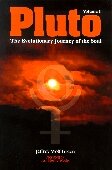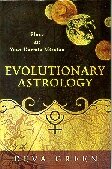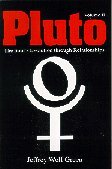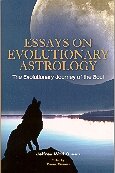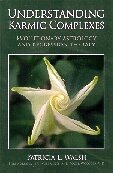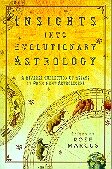Deva Green is Jeffrey's daughter. I put off stocking this book because I thought it would be a rehash of her father's (above). Which it is, but it's better written hash than I expected.
In Deva's book, Pluto is the soul, Pluto is the soul, Pluto is the soul. This is repeated & repeated in the first pages of the book:
Because the Soul correlates with Pluto in the natal birth chart, it is critical to deeply & thoroughly understand the meaning of Pluto when practicing this type of astrology. Pluto, or the Soul, then becomes the starting point and bottom line upon which all other factors in the birth chart are interpretted and given meaning. (pg. 1)
Because Pluto correlates with the Soul . . . (pg. 6)
The Soul, or Pluto, astrologically speaking, correlates to the genetic code, RNA, DNA, chromosomes, and enzymes. (pg. 12)
In the natal birth chart, Pluto correlates to Soul. Pluto, then, will correlate with the pre-existing patterns of indentity association, desires, and bottom-line orientation of an individual coming into the life. (pg. 14)
As we evolve by embracing the evolutionary necessities of the life reflected in Pluto's polarity point [the degree opposite natal Pluto], the natal position of Pluto will automatically regenerate into higher levels of expression. The old patterns, desires, and identity associations symbolized by the natal position of Pluto will die, or be purged, within the person - only for new patterns to be born into consciousness. Generally speaking, this describes the metamorphic process of evolution as the Soul exhausts its separating desires . . . (pgs. 15-16)
To be fair about it, Jeffrey started chapter 1 of his book with those exact words: Pluto correlates to the Soul and evolution. (Pluto Vol. 1, page 1). A father - daughter thing.
Well, okay, but does it work? Was Christ's ultimate sacrifice long ago not quite enough, did we had to wait for Mr. Clyde Tombaugh to discover Pluto (1930) and then for Mr. Green to delineate it (1985) - ?
I regret that I'm not quite buying it. Pluto-as-Soul is too close to too many other simple reductions: Saturn-is-your father, the-Moon-is-your-mother, the-south-node-is-your-fate, etc. Astrology is a lot more dynamic than that.
And here I have an advantage. I know, or I think I know, my most immediate past life. It seems I was a minor hisorical figure and as such, there are a few hard historical facts known about that life that guide me. I would love to be more up front about it, I would love to take all of you into my confidence, I would love to share, but, frankly, I will never quite believe it myself. There are days I wish it would all go away. If it's true, then I've learned things about myself that actually repell & disgust me, but which are still clearly part of me. And then there's the utterly repulsive statement that I believe that I was THAT MAN, now don't you think that's the most absurd statement you've ever heard!!? That Mr. Roell, he's clearly bonkers, believing things like that.
But when I line up that birth chart to my birth chart, when I line up his death chart to my birth chart (time of death was noted precisely, to my complete amazement), what I find is this:
Everything in the current chart relates to everything in the past chart. Broadly speaking, no one planet, no combination of planets, is favored. In the next life, planets react, as a whole, to the overall outcome of the previous life. Which is pretty much what you would expect. Throw a deck of cards into the air & they will come down in a different way every time. The position of the Queen of Spades (for example) is not any more special, is not any more indicative, than any of the other 51 cards.
If there's an exception to the rule, it's the Luminaries. In the last life, I had the Moon in Gemini in the 10th. The expected result: I was a big shot (but not because of the Moon alone), and, predictably, fell out of favor, the usual result of a 10th house Moon. I took it badly, which was my fault. In this life, the Moon came to be in Leo in 3. Think about that, think about the Moon's transition from a life of Gemini in 10, to a life of Leo in 3. Tenth house prominence became Leo, which, for the Moon, is the urge to swagger on-stage, which I have. Being in the public eye became a habit (the Moon rules habits), such that whenever I go out & run errands (3rd house), I still think everyone is looking at me. (They're not.) The world, having seen my previous 10th house persona, still expects I'm going to be witty & clever & changeable & maybe an outright liar (how the heck would I know?), in other words, they still expect me to be a Gemini, since that's what I had previously presented to them. Guess what? That's my current rising sign. Hung 'round my neck like a noose. This is how things can change, life to life, how they dance.
That life ended badly, more badly than you want to know. As a result, I have a great deal of anger, and a compelling drive to know WHY. How did those manifest in my current chart? The anger externalized as oppositions. The drive TO KNOW became a strong 9th house.
Which is subtly different from what the Greens are telling us. According to the Greens, the Soul (aka Pluto) puts us in various situations so we can evolve. By contrast, the Sun & Moon in my chart seems to have been arranged in order to provide me with the tools I was in need of. Which is to say, I am not my chart (you are not your chart). The chart is what you USE. You are something else. What that might be, I don't have any idea. Not even for me.
Okay, so what, then, is Pluto? In my chart, it's an intensifier. Which is all I think Pluto really is. A concentrated bit of anger that is best left alone. In my chart, it's conjunct the Moon, opposite the Sun. In the Green cosmology, the point opposite Pluto is the Polarity Point, the place where Pluto is trying to lead you. In my chart, that exact degree is the Sun. So I should head for my Sun, except that it's in Aquarius, where it's really trying to be anybody, anywhere else. Preferably in Leo, cuddling up with the Moon. Debilitated planets have polarity points, as I have noted in many charts. So my Sun really wants to be where my Pluto is, except that I don't want to be anywhere near Pluto. Sound like fun?
Earlier today I was stuck waiting for a lengthly CHKDSK to run on my hard drive. So I went page by page through Miss Green's book. It's okay. Solidly written. Do all the stuff she says & you might find out something, like looking through a dark glass. But she has some howlers:
Half the people on earth have this placement in their natal birth chart because Pluto is retrograde six out of twelve months in each year. (pg. 34)
No, Deva. Pluto is not retrograde six months of the year. Only a planet infinitely far from the Sun can be retrograde six months of the year. Pluto is retrograde about 5 months and one week.
The first case study we are going to analyze is former president Richard Nixon. The very underhanded methods he used to achieve power through acquiring the presidential office are well-known. Nixon continued to abuse the power and authority of the presidential office, and all his lies, manipulations, and deceptions were revealed before a horrified public during the Watergate investigation. Nixon resigned immediately after the Watergate scandal. (pg. 202)
No, Deva. Richard Nixon did not sweat it out until it was all over & only then leave. He was driven from power at the very height of the scandal itself. (His choice was leave voluntarily, or get impeached & forcibly removed. He fought to the very end.) Nor did his resignation end the Watergate investigations, though it did slow them down a lot. Curiously, her father had strong feelings about Nixon (Pluto, vol. 1) & it might be that Deva's opinions of Mr. Nixon, like her book, are borrowed from her father. Deva's Nixon case study runs nearly ten pages of text, but nowhere does she cite anything specific about Nixon or his life. We simply get a recitation of "this made Nixon this way" and "this made him that way". Which sounds rather second-hand. Deva Green omits, if I am not mistaken, the critical key to Nixon's chart as a whole: His Sun-Neptune opposition. Why is this? Perhaps because, elsewhere in the book, Deva has defined Neptune as consciousness (pg. 7: Astrologically, consciousness correlates to Neptune.), and, on page 89, with the "Spiritual State" (Astrologically speaking, this evolutionary state correlates with Neptune . . . ) She, like her father, believes that 2-3 percent of all souls are in such a state. Between these two correlations, a revised interpretation of Neptune would seem to be necessary.
Evolutionary astrology, as it's developing, seems to me to be shading into a religion.
The Forword, by her father, is undated. In it, we learn he is hard at work on Pluto, volume 3. (Personally, I suspect that Mr. Green is no more, and if I say that often enough, loudly enough, perhaps he will pop in to prove me wrong.) In the bibliography of Deva's book, there are but two books listed: Pluto, vol. 1, and Autobiography of a Yogi, by Yogananda. Why study bibliographies? They tell us where the author's head is, what they've been reading, what they know, what they think is important. And, by its omissions, a bibliography tells us other things.
Llewellyn, 319 pages.


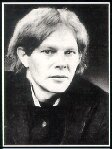 It seems that Evolutionary Astrology is going to be the Next Big Thing, perhaps to rival Jungian astrology. Evolutionary Astrology is based on the idea that Pluto represents the Soul, so that Pluto's placement, by sign and house, the aspects it makes, the degree opposite, and, critically, the nodes of the moon, are the clues to discovering your place in the world. Evolutionary Astrology will tell you "where you are" in terms both of your own personal quest, as well as where you fit in, in the world in general. That's the premise.
It seems that Evolutionary Astrology is going to be the Next Big Thing, perhaps to rival Jungian astrology. Evolutionary Astrology is based on the idea that Pluto represents the Soul, so that Pluto's placement, by sign and house, the aspects it makes, the degree opposite, and, critically, the nodes of the moon, are the clues to discovering your place in the world. Evolutionary Astrology will tell you "where you are" in terms both of your own personal quest, as well as where you fit in, in the world in general. That's the premise. Indicates a book on our Top Ten list. If you would like to find more books like it, click on the star.
Indicates a book on our Top Ten list. If you would like to find more books like it, click on the star.
